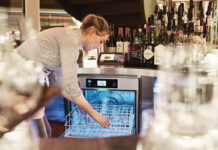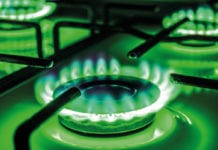
Value for money key in buying new washers
VALUE for money is now one of the most important factors in any business investment, and dish and glasswashers are no exception. Energy efficiency is a growing concern as operators look to cut costs, and manufacturers are tapping into this with new machines designed to trim running costs.
DC Products has introduced a glasswasher that runs on a 13amp supply instead of the usual 20amp; it’s also said to use less water.
Bob Wood, director of DC Products, said both water and energy consumption are “major considerations” when looking to cut costs, but there are other key factors to consider as well.
For example, in hard water areas a water softener will be required, which can increase the cost of a machine. Keeping the internal works of the machinery clean is another important factor.
“In terms of initial purchase, pay close attention to what you are actually getting for your money, and if comparing machines make sure the comparison is like for like,” said Wood.
“Some basic machines look good value but come with hidden costs and are poorly specified. By the time you add on extras like filters, a detergent pump and additional baskets you can easily be looking at an additional £300 on top of the initial purchase price.”
In terms of initial purchase, pay close attention to what you are actually getting.
Another supplier, Winterhalter, has introduced a new technology to increase efficiency in its washers.
VarioPower does exactly what the name would suggest, varying the power of the washer according to the products being washed. This means the technology, which is fitted as standard on the company’s UC Series of undercounter washers, will lower the water pressure for fine china or delicate glasses, or when soiling is minimal, but increases the pressure for heavier soiling.
The technology also automatically adjusts settings such as detergent and rinse aid.
“The technology ensures that Champagne flutes get sparkling clean under low pressure, just as heavy-duty beer mugs do on high pressure,” said Winterhalter marketing manager Paul Crowley.
Power consumption is clearly an important factor but buyers should also consider the reliability of the machine. Repairs are likely to bump up costs considerably.
Andrew Fordyce, director at IFSE (International Food Service Equipment), said caterers are turning to recognised brands as reliability becomes increasingly important.
“Of course price is always going to be a major consideration but caterers are starting to realise that an unreliable machine will prove to be expensive and may cause major disruption in the kitchen – often at the most inopportune moment,” he said.























